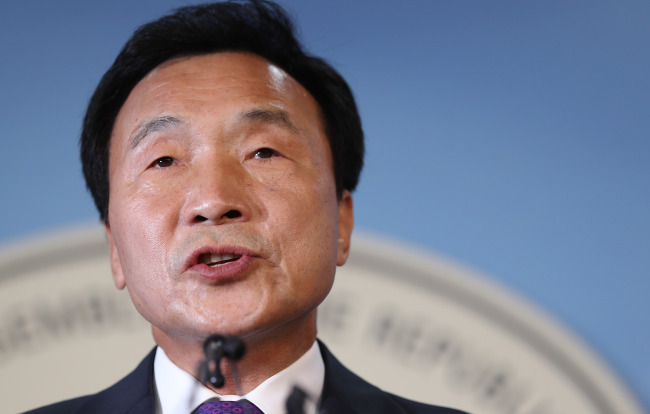After a humiliating defeat in the 2014 by-election for a parliamentary seat, former Gyeonggi Province Gov. Sohn Hak-kyu did not just cut all ties with the world of politics, he retreated from urban life to live in a mud-walled hut in a remote village in South Jeolla Province, spending most of his time reading books and meeting with local residents.
The 68-year-old centrist came out of the wilderness Thursday and declared a return to politics, where ideological schisms are still prevalent among the established parties.
“Now the mountain asks me to leave. I think it is time to leave” Sohn told reporters gathered outside his house at Gangjin County, South Jeolla Province, before leaving for the National Assembly in Seoul, where an official press conference was scheduled in the afternoon.
 |
Former Gyeonggi Gov. Sohn Hak-kyu(Yonhap) |
“Here I stand today to devote myself to transforming Korea’s politic and economy,” he said at the presser, as a crowd of his supporters and some Minjoo lawmakers watched.
To start anew and usher in new politics, the first thing he did was to discard his membership of the opposition Minjoo Party of Korea, which he headed in 2008 and in 2010. Back then, it was called the Democratic Party. In 2012, he vied for the party‘s presidential ticket but was defeated by Moon Jae-in.
“I will abandon everything I earned as a party leader including its membership,” he said Thursday.
The announcement came as a surprise to Minjoo members, who had expected their former leader to stay with the party and build ties with centrist lawmakers across the political spectrum, including former National Assembly Speaker Chung Ui-hwa.
The five-term lawmaker, who left Saenuri after the latest general election in April, had a private meeting with Sohn about a month ago to discuss “state matters.”
One of the strategies that Sohn, an academic-turned-politician, would use to boost his profile is revising the Constitution.
“I think that the Sixth Republic’s fate reaches an end” said Sohn during the Thursday’s press conference, referring to the term that describes the government based on the current Constitution that was last changed in 1987. “Whoever is elected as president, they would not lead South Korea under the current system.”
The reform of the basic law has often been at the center of political discourse, especially when the incumbent president is about to finish their five-year term. But, historically, the idea has mostly been broached by sitting a president and establishment parties’ frontrunners who want to seize the next administration.
Cheong Wa Dae has reiterated that they have no plan to change the Construction, arguing that the debate would undermine the efforts to boost the economy. Opposition parties presidential hopefuls, Minjoo former leader Moon and People’s Party former leader Ahn Cheol-soo, echoed the negative view.
Encouraged by Sohn’s defection from Minjooo, the People’s Party continued its effort to attract Sohn since the party emerged as the third-biggest bloc following the latest April election. Earlier last month, its former leader Rep. Ahn Choel-soo had a one-on-one meeting with Sohn to coax him into the centrist party.
The fledging party, whose approval rating has been hovering at around 10 percent following an infamous bribery scandal involving its incumbent lawmakers, has vowed to grant Sohn an opportunity to join the race to elect its presidential candidate. The election is slated for December.
“Now that Sohn has abandoned his party membership, we suggest he should join our party,” said People’s Party interim leader Rep. Park Jie-won on his Facebook account after hearing of Sohn’s defection. “He would give a new boost to our party.“
By Yeo Jun-suk (
jasonyeo@heraldcorp.com)








